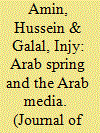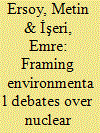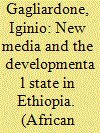| Srl | Item |
| 1 |
ID:
141335


|
|
|
| 2 |
ID:
178786


|
|
|
|
|
| Summary/Abstract |
‘The age of sustainable development’ has been characterized by an on-going debate over how to define development and which alternative energy resources to rely upon. It is high time to rethink the news media's role in this debate due to transformations in journalism, particularly the role of the media in harnessing the sustainable energy transition. Accordingly, this paper examines the role of the news media in environmental debates over Turkey's nuclear program within the country's polarized media system. Adopting a content analysis method, the paper illuminates how selected media outlets (three mainstream and one online alternative) have framed and disseminated debates over Turkey's nuclear program. The findings reveal that the media system matters in public debates on energy, but also that the alternative media have the potential to contribute to societal debates on issues – even within a polarized media setting – by voicing unspoken ideas.
|
|
|
|
|
|
|
|
|
|
|
|
|
|
|
|
| 3 |
ID:
133252


|
|
|
|
|
| Publication |
2014.
|
| Summary/Abstract |
The Ethiopian government, led by the Ethiopian People's Revolutionary Democratic Front (EPRDF), has developed one of the most restrictive systems for the regulation of new media in Africa. So far, most discussion has focused on the measures employed by the EPRDF to prevent the Internet and mobile phones from becoming tools for opposition forces to challenge the regime. Much less attention has been paid to the strategies pursued in order to make new media work in support of the government's ambiguous but ambitious attempt to make Ethiopia a developmental state. Examining the period between 1991 and 2012, this article explores how the EPRDF gradually moved from a simple strategy of information control towards incorporating new media into its state- and nation-building efforts through large-scale projects such as Woredanet and Schoolnet. Larger trends at the international level, including the securitization of development and the growing significance of China in Africa, have legitimated the use of the media to serve development outcomes, and have facilitated the spread of the kind of 'developmental media system' that has emerged in Ethiopia. The article concludes that only by engaging with these systems on their own terms and "going with the grain" can we develop a better understanding of how they work and how to change them.
|
|
|
|
|
|
|
|
|
|
|
|
|
|
|
|